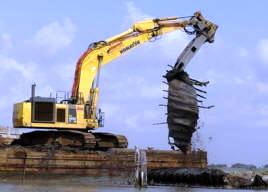|
Unique Cruise Solutions The news you need to know |
|||||||||||||||||
|
|||||||||||||||||
 |
|
|
|||||||||||||||
|
Cruise News for the Corporate Travel Professional |
|||||||||||||||||
|
Texas targets decades of abandoned ships off coast |
||||||||||||||||
PORT LAVACA, Texas – A giant pair of shears descends from a
70-foot crane above the Gulf of Mexico, grasping a chunk of metal and ruthlessly
crunching it in clippers with a dinosaur-like six-foot bite. This
massive 300,000-pound machine is part of Texas' attempt to clear its waters of
unwanted ships, boats and rigs that have been scuttled there. This
massive 300,000-pound machine is part of Texas' attempt to clear its waters of
unwanted ships, boats and rigs that have been scuttled there.Texas used to allow residents to dump unwanted fishing boats, sailboats, or even barges or rigs in state waters, leaving them to rot and sink. The state knows of more than 400 such vessels and has stepped up efforts to enforce its ban on the practice, which was abandoned in 2005. The scuttled vessels are environmental and navigational hazards to coastal communities and the fishing public. Now Texas officials are hoping Louisiana also enacts legislation against the practice because residents are crossing the state line to dump unwanted boats and ships carrying fuels, oils and batteries that will harm the environment for years. William Grimes, a training and response coordinator in the oil division of the Texas General Land Office, has encountered Civil War-era vessels and an entire group of World War I-era ships scuttled by the Navy sometime in the early 20th century. "It was a different world 100 years ago, and scuttling vessels was not an uncommon thing in that time," Grimes said. "The Gulf of Mexico is filled with hundreds, if not thousands, of vessels that were scuttled by their owners, in some cases even by the federal government. We realize the impact of that now." Some evolved into vibrant marine habitats, home to hundreds of fish and wildlife and prime ground for the state's fishing public. Others — especially gargantuan steel barges — sucked life out of the seabed, either trapping crabs and other aquatic life or squandering the oxygen needed for survival. Hurricanes — from Katrina in 2005 to Ike in 2008 — have carried abandoned vessels into downtown New Orleans or plunked them onto Texas highways. Then came the recession. "One thing we learned, is when hard economic times hit, the first thing people abandon is their boats," Grimes said. Texas first made it illegal to scuttle vessels in the water in 2005, then strengthened the law in 2009, providing Grimes with the authority to track down the owners, issue them warnings — kind of like cities do when people abandon unwanted vehicles — and then remove the vessel if necessary. Removing the vessels, however, costs a minimum of $100 per foot — the most expensive removal cost $2 million — and the state has not dedicated funds to this. So Grimes pairs up with local governments, nonprofits and even scrap recyclers that remove the steel vessels and cash them in. Extreme Scrap and Recycling is one of those companies; it had the 70-foot, 300,000-pound shears contraption built especially for these projects. Jeffrey Fuller, the company's field superintendent, said the company has helped the state remove some 250 vessels since 2005 within a 250-mile stretch of water from Orange, on the border with Louisiana, west to Port Lavaca. Between 200 and 300 more remain in the 80 miles of water from Port Lavaca to Corpus Christi, he added. Now Fuller hopes Louisiana will pass similar legislation to prevent Texans from towing their unwanted boats next door — and to avoid finding abandoned shrimp boats in downtown New Orleans when the next hurricane hits. "The whole state is just littered with old, abandoned vessels," Fuller said of Louisiana. "Texas had this problem too, but now we're getting it cleaned up." |
|||||||||||||||||
|
|
|||||||||||||||||
|
|
|||||||||||||||||
|
|
|||||||||||||||||
|
Worldwide Travel & Cruise Assoc., Inc. 150 S. University Dr. Ste E, Plantation, FL 33324 - USA Tel: +1 954 452 8800 Fax: +1 954 252 3945 EMail: sales@cruiseco.com |
|||||||||||||||||
|
Designed & Published by: Worldwide Media. |
|||||||||||||||||




